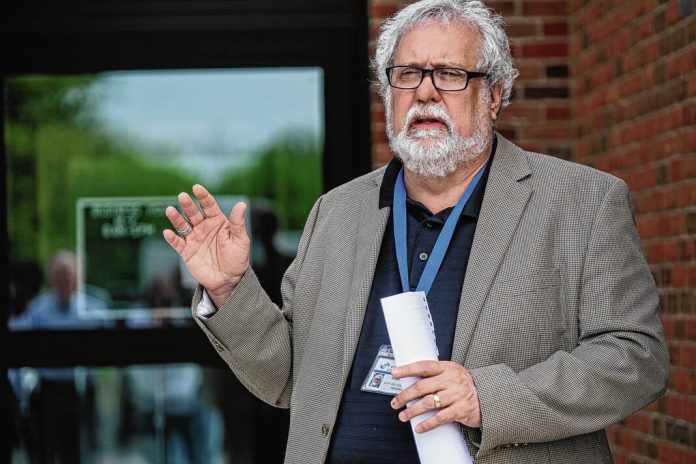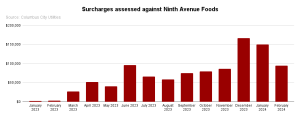
Mike Wolanin | The Republic Columbus City Utilities Director Roger Kelso addresses guests during a ribbon cutting ceremony to show off the remodeled and updated area of the Columbus City Utilities building in Columbus, Ind., Thursday, April 20, 2023. Portions of the facility to were recently remodeled and updated. The Security features were added to the main lobby to control access to employee areas. Handicap parking spaces and the sidewalk were updated to comply with the Americans with Disabilities Act. The business office received new furniture and carpet.
Columbus City Utilities has approved a plan to bring Ninth Avenue Foods into compliance with the city’s wastewater discharge rules after the California-based company was found to be “out of alignment” with its permit and racked up nearly $1 million in surcharges.
The plan, called a compliance schedule, outlines a series of steps that Ninth Avenue Foods must take to “lessen their impact” on the city’s wastewater treatment plant, city officials said.
Currently, the company is using up about half of the city’s entire wastewater treatment capacity and has been exceeding limits on levels of oil and grease in wastewater, as well as biochemical oxygen demand, or BOD, a measure of how much oxygen is needed to remove waste organic matter from water with aerobic bacteria, officials said.
Ninth Avenue Foods was the only local employer that was in non-compliance with local rules every quarter last year, according to city and state records. The company also has been assessed $994,359 in surcharges since January 2023 due to non-compliance.
However, officials said there is no quick fix to the issues given the size of the company’s 220,000-square-foot facility on the south side of Columbus. They expect it will likely take over a year to bring the facility into full compliance.
The compliance schedule includes a July 2025 deadline for the company to be in full compliance.
“Unfortunately, with large (facilities) like this, it’s not as easy as some of our other folks,” said city utilities director Roger Kelso. “A lot of other folks, when they get out of compliance — which happens from time to time, it’s just the nature of the beast — they fix it in a couple of days. With this particular (facility), it’s literally going to take them months and months, in excess of a year, to get it all 100% up to (compliance.)”
Representatives with Ninth Avenue Foods did not respond to a phone call or email seeking comment on the compliance schedule.
Officials said oil and grease can pose problems for the city’s wastewater treatment plant, as they can coat the microorganisms that the city uses to treat wastewater and make them work less efficiently. While the plant has equipment that can deal with excessive levels of oil and grease, it “would cause our plant to be overloaded” should it continue for a long period of time, Kelso said.
In the case of Ninth Avenue Foods, the oil and grease come from substances such as dairy fat, officials said. Ninth Avenue Foods specializes in making dairy and dairy alternative products including plant-based milks, such as soy, almond and oat milk.
The plan to bring Ninth Avenue Foods into compliance comes about two and a half years after city and state officials offered the California-based company millions of dollars in incentives to locate its Midwest headquarters and production facility in Columbus in hopes of diversifying the city’s manufacturing base, which is heavily concentrated in the automotive sector.
In 2021, the Columbus City Council approved 10-year tax abatements that city officials said at the time would save the company $4 million in taxes on real property and $3.7 million in taxes on personal property over the decade.
In addition, Columbus City Utilities agreed to extend a 12” water main 2,000 feet to serve the facility and future developments along County Road 175W.
The Indiana Economic Development Corp. also offered Ninth Avenue Foods up to $1.1 million in conditional tax credits based on the company’s job creation plans, the IEDC said in a statement in 2021.
In return, the company pledged to invest about $103.5 million to build a dairy and plant-based beverage facility on a 40-acre site located just east of the Woodside Industrial Park, on Columbus’ south side, and employ 101 people by the end of 2024.
This past August, Ninth Avenue Foods told the city that it had recently finished construction on the production facility and was employing 85 people. The company said it expected to be employing 101 people by the end of 2023.
At the same time, city records indicate that monthly surcharges assessed against Ninth Avenue Foods had already started to rise. Kelso said “you could look (surcharges) as a fine” or additional fee for non-compliance.
In January 2023, the company was assessed $1,967 in surcharges, records show. By March 2023, the figure had grown to $26,671 and then nearly doubled to $51,729 in April before reaching $95,554 in June.
However, the increasing surcharges did not stop the company from asking for an additional tax abatement from the city.
In August, Ninth Avenue Foods asked for a personal property tax abatement for a proposed $18 million in new equipment, including new processing and packaging lines, which company officials said would create 10 new jobs by the end of 2025, according to city records.
The Columbus City Council was set to vote on the matter in September, but the request was tabled after a couple council members had questions about the company’s wastewater discharge.
Joe Lunzer, vice president of property development at Ninth Avenue Foods, told The Republic previously that the company had decided to “press pause” on the request until the wastewater issues had been resolved. He emphasized that the company “is not discharging into rivers, ponds or streams.”
“This discharge is going to the Columbus wastewater treatment facility, as intended, to treat the water,” Lunzer said. “That said, we are actively meeting with Columbus City Utilities and Columbus city management around the issues and are committed to a positive resolution for all the parties involved.”
But since then, the monthly wastewater surcharges levied against the company have climbed, reaching $166,608 in December, nearly triple the $58,041 assessed against the company when it requested the additional abatement, local records show. This month, the surcharges totaled $94,113.
Kelso, for his part, described the situation with Ninth Avenue Foods as “out of the norm,” even for new employers. “We typically don’t experience either things of this duration or this volume of impact,” he said.
In 2021, Lunzer told The Republic that Columbus’ wastewater treatment capacity was one of the reasons why the company chose the city over 25 potential sites in Indiana, as well as other locations in Virginia, Tennessee and North Carolina.
“We use a lot of water in some of those plant-based products, but also with a hyper-clean environment, we do a lot of cleaning,” Lunzer said in 2021. “Everything that we use is food-based, but we have to clean a lot. We use some steam, some gas fire boilers, which, because of our processes, aren’t able to recycle as much condensate as a traditional boiler. So that ends up in the waste stream, and so there’s a high level of flow. It’s not a pollutant in any way, but it is something that needs to get treated. …It’s always easier to treat waste streams on a macroscopic level than try and do it on site.”
“That part of it eliminates some sites,” Lunzer said. “They just don’t have that kind of capacity.”





